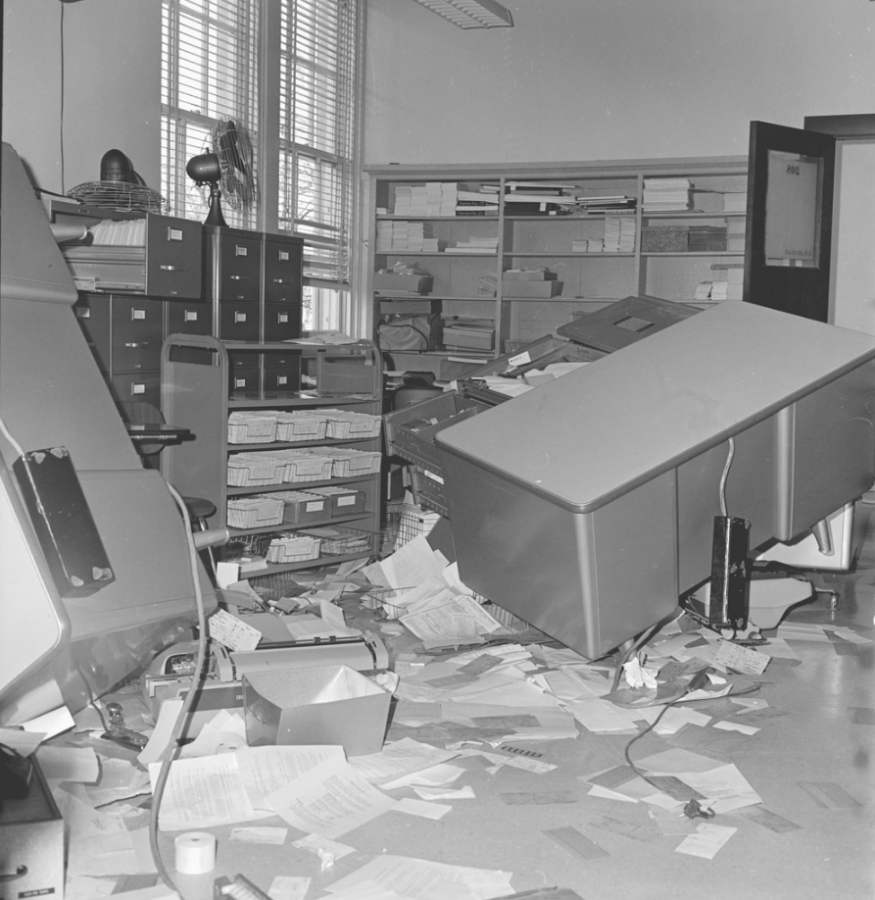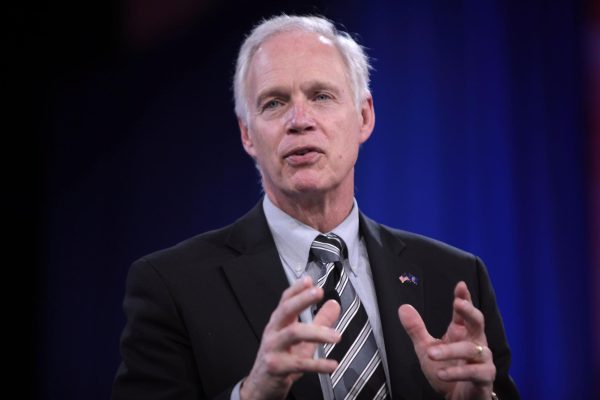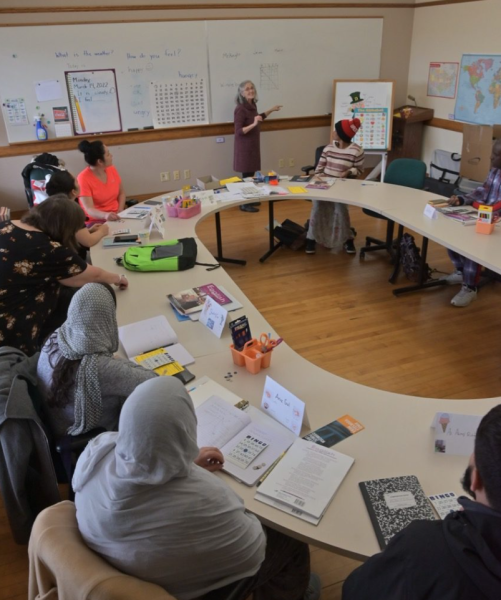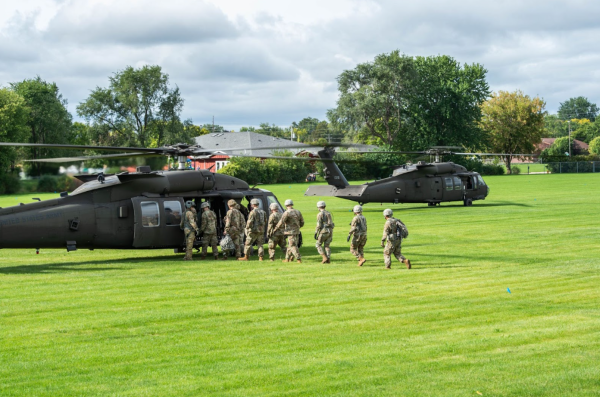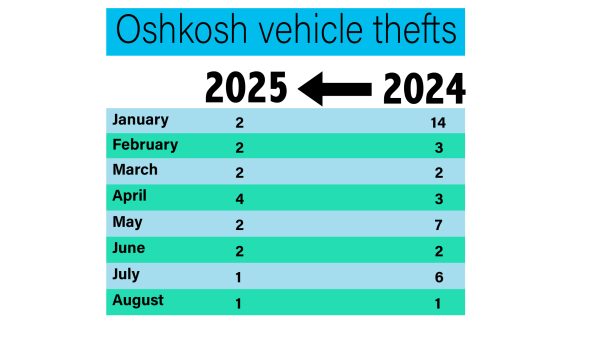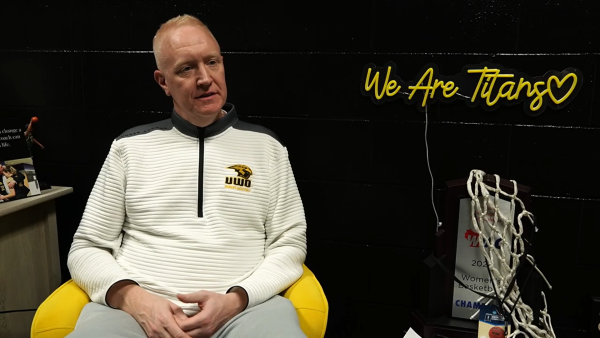Black Thursday remains significant 5 decades later
Photos courtesy of UW Oshkosh Archives
Pictured is the destruction that occurred in the office of Roger Guiles.
Although the events that transpired on what came to be known as “Black Thursday” occurred 50 years ago, the University of Wisconsin Oshkosh campus continues to preserve its memory.
UWO Director of the Academic Support of Inclusive Excellence Byron Adams said Black Thursday is just as relevant today as it was 50 years ago.
“The students that engaged in the dramatic demonstration of Black Thursday did so to fight for what they knew was right when their requests for equal rights and inclusion were ignored,” Adams said. “Those tactics were no different than what we saw during the civil rights movement to the Black Lives Matters demonstrations of today.’”
People of all ethnicities, race, gender and sex are targets of hate crimes. According to The Statistics Portal, the most victimized racial or ethnic group is African Americans.
Adams said he thinks Black Thursday is arguably one of the most important events to occur not only at UWO, but in the community at large.
“By retelling the story of Black Thursday, we can recapture the causes and repercussions of the demonstrations waged by the African-American students in 1968 that still affect all of us to this day,” Adams said. “As UW Oshkosh continues to grow increasingly diverse, it is important that we remember and confront its complicated racial past so that we can become a truly inclusive community today.”
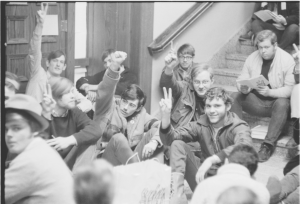
Students peacefully wait for President Guiles’ decision in Dempsey.
UWO student Ireen Mbekeani said she encountered a problem on campus last year that was not addressed properly.
“Last year I was in student government, and they talked about a few issues they were having in the dorm, like racial slurs being said and being written on people’s dorms,” Mbekeani said. “I even brought it up to [campus] government and said, ‘Hey, we should raise awareness about this and let people know this is a safe place they can come.’ But nothing ever happened, there was never any initiative to do anything.”
According to the Associate Vice Chancellor for Academic Support of Inclusive Excellence Sylvia Carey-Butler, UWO has made great strides in making the campus more inclusive.
“This fall, we increased the students of color on this campus to 15.7 percent,” Carey-Butler said. “In 2013, we were at 11.4 percent.”
Carey-Butler said despite the positive changes, the University still has a long way to go.
“We have no African-American faculty members,” Carey-Butler said. “You can’t be what you can’t see. There are very few folks of color here who can really also be a role model just by virtue of their presence, just to say you can do this because I’ve done it.”
History department chair Stephen Kercher said the importance of inclusiveness doesn’t stop at UWO.
“It’s more than just the University, it’s about the city and the community,” Kercher said. “We’ve never been an island all by ourselves. I remember many of the ‘Oshkosh 94’; some of them would say it wasn’t so bad on campus, but the minute they would step off of campus and they went to a bar or restaurant, it was bad.”
Carey-Butler said she is working hard to make students of color feel welcomed outside of the University as well.
“We partner with the mayor and many other individuals, the school system, the district attorney, as we have put something in place called ‘Unity in the Community,’” Carey-Butler said. “It is an event in April where we can all come together to learn something about each other, to learn about the different cultures that reside in the community, to create space outside of the University where students feel like they are welcomed and affirmed as well, so we can’t be an island by ourselves because our students are living and working in this community.”
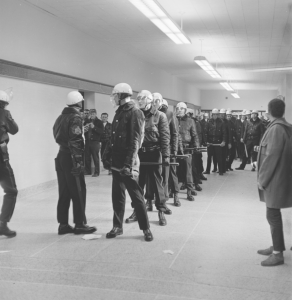
Police line up and down Dempsey hallways, ready to escort students to idling vans.
Kercher said the 2016 presidential election and the correlation of the racial hate acts that happened after needs to be examined.
“The last couple years have been a speed bump on my hopefulness, but I never give up on hope completely,” Kercher said. “I think this is one of the great questions that we have in this country is how do we understand what happened in 2016; is it race or is it class or what is it? The way people are arguing, we still don’t know. How much did race really matter in 2016, and there’s a good case to be made on both sides.”
Carey-Butler said she maintains her hope because she sees more than violence occurring in the world.
“I think all across the country, this is a very difficult time,” Carey-Butler said. “But here’s what I believe: I think there are so many people who are committed to not only diversity but inclusion that those voices are being drowned out, and I think that were going to discover that during this event. I have hope because I run into people all the time who look different, love differently than me and I don’t feel that distance.”
Kercher said the election of former President Obama was a huge step in the right direction for our nation.
“Ten years ago, Barack Obama was elected,” Kercher said. “I had spent an entire year researching Black Thursday, and I remember thinking ‘god, this community is nuts’. I remember seeing Barack Obama when he came to this campus in October that year, I was standing outside of Kolf and you couldn’t get in, the place was packed to the rafters. The mere fact that this community that I had been studying all showed up was really remarkable. That’s why I still have hope.”
Carey-Butler said Black Thursday is a great excuse to examine the past and the present in order to make a greater change.
“There’s an African bird, San Kofa which means, you look back to look forward,” Carey-Butler said. “I think this is an opportunity for us [as] an institution to pause and reflect on a horrific tragedy that took place because it changed the lives of these 94 students, but it’s also saying we are not who we were. We still have some distance to go; we’ve made some great strides.”


